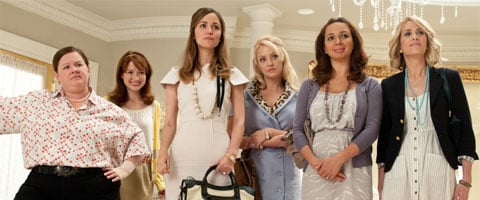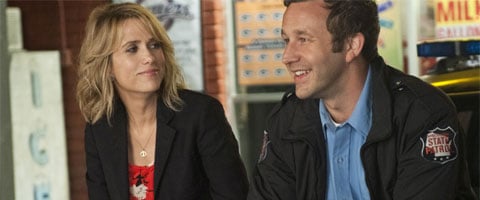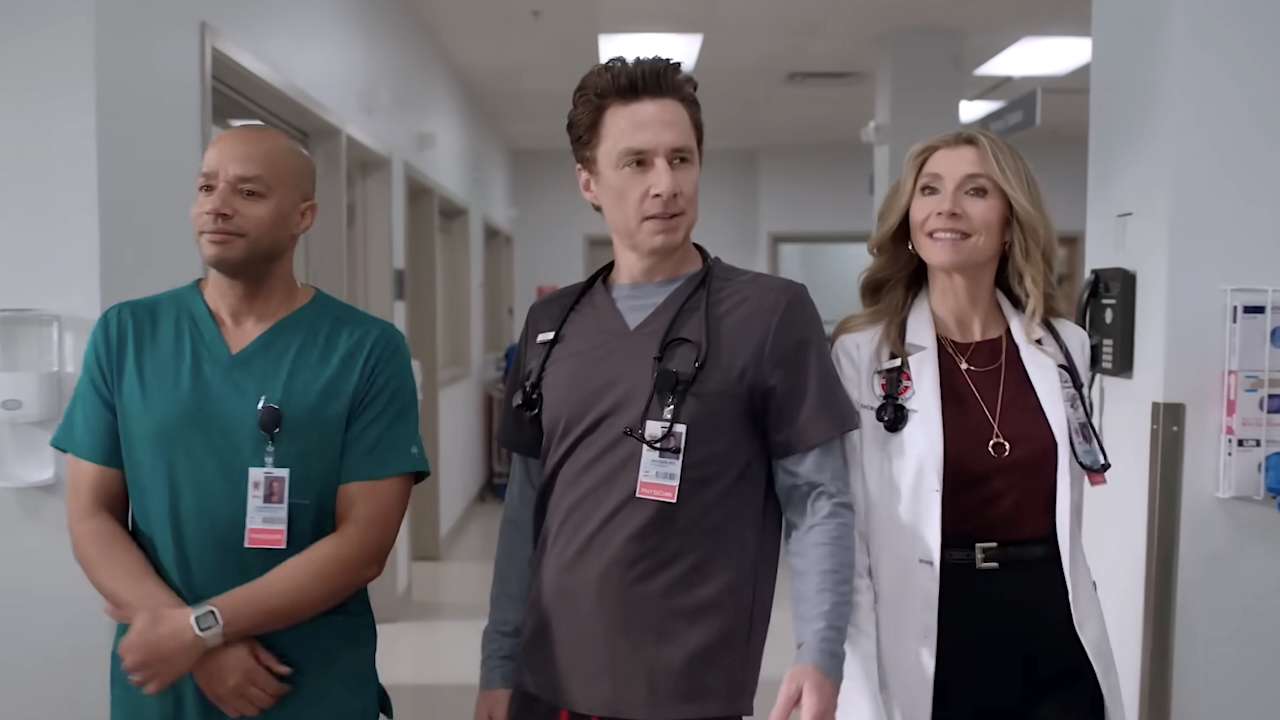Exclusive Interview: Bridesmaids Director Paul Feig

Your Daily Blend of Entertainment News
You are now subscribed
Your newsletter sign-up was successful
When writing up interviews I typically prefer to keep my opinion out of the mix, but for Bridesmaids I will make an exception: I truly loved this film. In recent years the female-driven comedy has been reduced to brainless, pandering, humorless romantic comedies that are made with the mindset that women will watch anything with a female lead. Bridesmaids, however, not only proves that this type of film can be entertaining and appeal to a mass audience, but that women are actually funny. Needless to say I was thrilled when I learned that I would be getting the opportunity to speak with the director, Paul Feig, one-on-one.
A couple weeks back I had the pleasure of covering the press junket for the new film (see my interview with star Ellie Kemper here) and while I was originally meant to have a 15 minute interview with the director, we ended up talking for more than half an hour. Because I don’t wish for you to , I’ve split the interview into two parts, the first half of which you can find below.
In the first part of our interview, which you will find below, Feig discusses the perception of women in the typical romantic comedy, the evolution of the script through production, finding the right male members of the cast, and landing some incredibly funny women for roles without lines. Be sure to come back later today when part two goes up!
It’s kind of a simple question with probably a complex answer, but the hell don’t we see more female-driven comedies like this?
I have no idea, it’s really criminal because women are so funny. But I think people have a hard time even trying to figure out the best way to, it’s not even how to write it, but how to pull it off. We nailed it, but… I feel like we did a good job because there tends to be a thing with female driven comedies where they’re very over written and they’re also, the stories tend to get very broad. And for Judd [Apatow] and I it’s really just making sure, you want to ground it in reality and to make sure there is a story that is an emotional story that’s driving it, and then you layer the comedy on top of it. There’s been some really good movies with feature women casts, you know, First Wives Club and those kind of things, but in general they tend to be a little more amped up, a little screechier, a little more like, they’re cat fighting, they’re against each other.
Just playing to tropes.
Yeah, and I think women are kind of like, “We’re not like that, we’re not that insane.” It always smells to me a little bit. Also women will write them too, cause it’s kind of like, “Oh there’s a bunch of guys saying this,” but some of those scripts were written by women. I just think there needs to be a balance. You have to have both sides, both genders weighing in and keeping each other honest, you know, because there’s nothing worse than watching a movie that women do and all the guys in it are ridiculous. You know, like, “Well guys don’t act like that.” But then you go, “Yeah, well that’s how women feel every time they’re watching a movie that guys do.” So it’s really just empowering, you know, being smart about it, empowering the people in it. The big thing for us, I think the thing that makes the big difference, is having hired women who are so strong and letting them have their voice and not us dictating the voice to them, but bringing them into the process and letting them build characters out of rehearsals. Because then you’re just going into battle with the strongest possible people. Then you just kind of set up the situations and cover the way that they let them go and kind of get out of the way, just guide it along, “Well try this, try this, this makes me think of something,” and somebody else will throw a joke in, and just throw it all in, and then you have all this material. There’s nothing worse than when you shoot a comedy and you show up in the editing room and all you have is the scripted version of every scene. If it doesn’t work, you’re dead. And you don’t know what’s going to work. There’s jokes that we think are just going to destroy and we put them up and they get nothing. And then other things you’re like, “Is that funny?” and then it goes through the roof. Anybody who says they know, they don’t know.
Your Daily Blend of Entertainment News

On that same note of improv, I mean, all you have to do is watch the trailers versus the final cut to know that obviously there was a lot of improvisation. Was it ever a challenge to kind of keep it on point?
No, I like when they will just go off. And sometimes you know there’s a tangent that you’re just never going to use, but it’s kind of like, oh okay, maybe let’s try this. It’s always steering the ship but never in a way of, there’s nothing worse than being like, “No, what are you doing! Stop it!” I just want to create a positive environment for them where they can just feel very safe and free to try anything. I love when somebody tries something so weird. I’m like, “What the hell was that!” I’d rather have that than people holding back and feeling like, “Oh, if I say that they’re gonna think I’m weird.” Because sometimes, the weird thing that you say is the funniest thing, just like, “Where did that come from.” But it’s the left turn, the joke that you never heard before. It’s funny, you know it’s very nice that Shandling, you know, Garry Shandling, came to the premiere last night. He was so sweet because he loved the movie and he said, “There’s like thirteen things in this movie comedy-wise that I’ve never seen before.” And I was like, that’s nice, but that’s only, it’s not because we’re such geniuses, it’s because, just letting these women go and surprise us with stuff, or trying to surprise them and letting them correct it so that it didn’t feel fake to them, like we had something that we wanted and then they were kind of like, a woman wouldn’t do that, I was like, “Well what would be the version of that that a woman would do?” and they would adjust us and we’d go.
One of the things that’s great about the comedy in this is that, in many ways it could be referred to as guy humor, for example the fitting room scene, but at the same time it’s never women acting like guys. When you were making the film was that something that you were making sure of?
Yeah, we were never, again if it comes from a real emotional place, what’s behind it is driving the story forward in a sensible way, then it works. That’s a very interesting case in point, that scene, because originally it was the girls just trying on dresses and there’s kind of an argument about which, a face-off about which dress they liked the most, and then it had some other stuff in it. We were kind of like, yeah, it’s fun but we kind of want to get a big set piece in, and it was kind of Judd blurting out, “They all get food poisoning!” and we went, “Oh that’s hilarious.” So we kind of had all this outrageous stuff, and there was some nervousness about it because it might just be too broad, but then it was kind of realizing, and Judd kind of led the charge on this, that the comedy of the scene is not, if it was just everybody vomiting and shitting, it doesn’t mean anything, you’re kind of like, “Okay, it’s a white place and they’re gonna ruin the place.” But what’s funny about it is that it’s, Kristin/Annie is basically being presented with overwhelming evidence that she fucked up, and she will not admit that she fucked up. And that the other part of the comedy is all these women pretending nothing’s wrong, like, “I’m fine, I’m okay, I just gotta get off the carpet, I gotta get out of here.” That’s what makes it funny. Then you’re driving toward something, and it’s character-wise, you’re learning about Annie’s character, which is she will not back down in a fight, and that’s one of her problems in life, is she can’t self-examine and admit that she’s wrong. So then there’s a reason for it.

Would you classify her as stubborn?
The character? Yeah, I think so, yeah. It’s a character who’s not changing her life. You know, the fact that she’s presented with the good guy, officer Rhodes, she invents a reason to get out of there, she’s not used to accepting, to being appreciated that way. She got left by a boyfriend that we didn’t even meet but you know, clearly he was a jackass. When her business goes under, he takes off. That’s what I think is the most relatable thing, and I think it will be why people like the movie. It’s very funny but you’re still invested in her. It was very important for us that she’s not a loser. If it would have been a movie about her and she’s just always been a disaster, you might not have patience for all these things she’s going through, like when she leaves the cop’s house, or when she blows up in the shower. You’d be kind of like, “Ugh, this person is just such a mess.” But, by having it, seeing early on in that little sequence where she bakes a cupcake and she’s looking at the ads on her wall from her old bakery, you’re like, okay, she was together at one point. She opened a bakery, you see that picture of her in front of the bakery and she looked confident. You like her, and then you see her baking the cupcake, she’s really great at it, so then you’re kind of like, oh good, this is a person who’s in a rough, who’s fallen from grace, they’re in a rough patch, but I want them to be who they were. So then you’re rooting for her. It’s like, “Okay, don’t fall back, don’t fall back.” So that propels you through it.
The principle cast is absolutely phenomenal, but I also just noticed, I mean, you have tons of female comedians, filling in as extras. You have Nancy Walls and Melanie Hutsell playing tennis, and I saw Jillian Bell getting dragged off screen during the bridal shower. How did that happen?
You know, it was just, we had all these, every time we needed to cast a woman for a role it was just like lets, we have so many funny people, lets just call them in. I have guilt that Nancy Walls is in one shot, because there is something bad about, like, well here’s the person you love and they’re not gonna do anything. But we went into it kind of, everyone had something to do and the movie just became so big and so long, like, okay, what’s our main story? We’ve got to cut it down. So I’m glad they’re in there but I do have guilt that they don’t get to do more. Which for me is just like, more women’s comedies, because all these women are out there and they’re hilarious.
I was gonna say, it’s just kind of a subtle way of saying, all these women are so funny, we’ve got to give them more to do.
And that doesn’t even include all of the women we saw who we love who we couldn’t even use in the movie because there wasn’t enough roles. But they’re all out there.
In addition to the women you also have some great guys in the film and I’m curious, obviously that casting was important as well, so how did you know that they were the right people for the parts?
Again, we pick people we’re fans of. I mean, like, Hamm, I worked with him on Mad Men and Kristin’s worked with him a bunch on SNL. I know how funny he is and she knows how funny he is so it was a no brainer for us right off the bat of, “We gotta get Hamm in this,” and the minute the Ted part popped out it’s like, it’s gotta be him. Who else could play that role and make it lovable? But then Chris O’Dowd, that was a role we brought a lot of guys in for, were auditioning for…

Were you specifically looking for someone Irish?
No, not at all. Because the fact that he’s playing a cop, it’s actually the last thing you want, the Irish cop. So we saw all these people and they were great but there were actually a few stars that we were thinking about offering it to but then Allison Jones, our casting director who we always work with, I’m a big fan of The IT Crowd, which Chris is from, but nobody else knew him and he walked into the room and I freaked out. I was like, “Oh my God that’s Chris O’Dowd,” but nobody else, they don’t know that show so they didn’t know him. He came in and did it with an American accent. You know, he has a great American accent but it was kind of like, “Oh Chris, try to do it with your natural accent.” And the minute he did, it just so clicked. Christian’s like “Oh my God, I love this guy.” The chemistry was there so then it was just a no brainer, “Alright, he’s in.” But then, look at Matt Lucas, one of my heroes, and the roommate’s role was always written very specifically as, she was living with this kind of guy who’s kind of skeezy, and so we saw a ton of guys like that and they were all very funny. But at the same time, I’m a huge Little Britain fan from years ago, but Matt had contacted Judd before we even started the film just like, “Hey, if you ever have a role in something I’d love to do it.” At the same time, he got a hold of me, because he wanted to meet me because he’s a Freaks and Geeks fan, which is nice and then it was just, basically kind of going, “I don’t know, is this character right? Is this character right?” It wasn’t really, Matt didn’t happen until Rebel Wilson came in and we were always looking at her possibly as one of the bridesmaids and in the end we were kind of like, “Eh, she might not just fit in the group, but she’s so funny we’ve got to use her somewhere.” And then I just go like, “She looks like Matt Lucas…They looked like they could be related…They kind of look like brother and sister.” Then it was just like, okay, throw out the whole, what we had for the roommates and now let’s just re-write it to fit them.
It sounds like a lot changed from the initial script.
Yeah, the basic story was always there, but you know what, you have to. Comedy has to be a very movable thing because you get all these people to come into auditions, unless you know exactly who you’re writing it for out of the gates. All these people come in, and the mistake that gets made time and time again is there’s roles, and it has to be this type of person. So people come in and you’re going, “Oh, they’re so great, but shoot, they’re just not like this person,” or, “Oh, they were nice, remember them.” You’re so dumb, because that person was so great and it’s like don’t let that person go out the door! Get that person in the movie! What you wrote is not that great, it could be much better. So we just collect these people, but then also, Kristin and Annie had written the role of Rita, which is, they wrote that for her right out of the gates. But then Melissa McCarthy, that role was very different, the Megan role. At the very end of the process we saw a bunch of funny women but never quite felt like we had it yet, and then Kristin said, “Well you should see my friend Melissa.” She came in and did this character that was completely different.
What was it like before?
It was originally different and she was very, kind of a mousy, kind of nervous woman who kind of liked Annie, kind of idolized Annie and was always tagging along. It was written very funny, but then when Melissa came in with that character, it was like, “Oh my God. Let’s change it.” To the point even where, you know the scene where Megan comes in and kind of gives her the attitude adjustment? That was originally scripted, that there was an Indian woman calling from a bill collection center in Mumbai or something that Annie kept on hanging up on throughout the movie just to show she was in debt. And then that woman finally got her on the phone and gave her the, “You’ve gotta get your life together” speech. So it was kind of, “Do we want to hang this off to some third person? Well we’ve got Melissa who’s so funny, so let her, she’s gonna be the one.” So then Annie and Kristin re-wrote that scene to make it work. She comes over and then we threw it to Melissa on the set, who just went for it. And it was so funny.
Read part two of my exclusive interview with Bridesmaids director Paul Feig right here.

Eric Eisenberg is the Assistant Managing Editor at CinemaBlend. After graduating Boston University and earning a bachelor’s degree in journalism, he took a part-time job as a staff writer for CinemaBlend, and after six months was offered the opportunity to move to Los Angeles and take on a newly created West Coast Editor position. Over a decade later, he's continuing to advance his interests and expertise. In addition to conducting filmmaker interviews and contributing to the news and feature content of the site, Eric also oversees the Movie Reviews section, writes the the weekend box office report (published Sundays), and is the site's resident Stephen King expert. He has two King-related columns.
